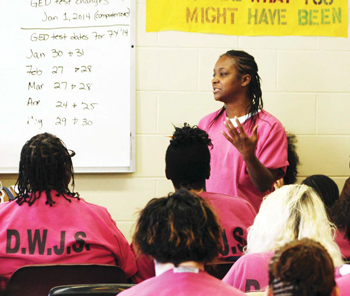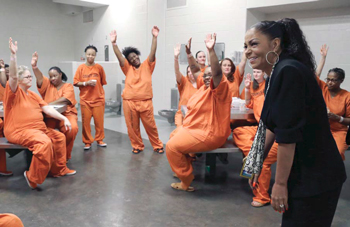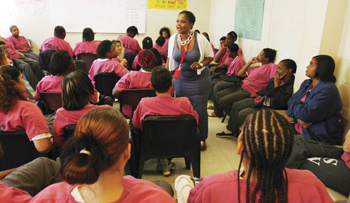#Save Our Girls USA: Healing, empowerment and survival
By Charlene Muhammad -National Correspondent- | Last updated: Jul 29, 2014 - 11:57:37 PMWhat's your opinion on this article?
Women who escaped ‘the life’ work to help others and prevent new victims

Sheila Johnson, 33, addresses other inmates during a meeting of Prostitution Anonymous at the Cook County Jail in Chicago, on Aug. 16, 2013. Johnson told her peers how she had a difficult time breaking free from a boyfriend who was also her pimp. She was addicted to drugs - and, she admitted, “the money.” “As a regular person, I wouldn’t dare do the things that I did because I was on drugs,” she said after the meeting,
|
The survivor-advocate was 30-years-old when she finally exited the life, armed with an understanding of why the crisis persists today and pathways to heal, restore and empower young victims.
“The problem of child sex trafficking persists because of the demand. As with anything else, remove the demand for it and it wouldn’t exist,” stated Ms. Morrissey, associate director of My Life My Choice, a Boston non-profit, which works to prevent commercial sexual exploitation of adolescent girls. They work to keep the girls out of strip clubs, massage parlors and other so-called legitimate businesses used to hide and facilitate prostitution.
“It’s that attitude of it’s a victimless crime. ‘She does it because she likes it,’ and that’s why it continues to happen. It is still a profitable multi-billion dollar, and I don’t even like to use the word business, but it is raking in billions of dollars and it’s always about the demand,” Ms. Morrissey said.
The sex industry has a tremendous and awful impact on victims’ bodies, minds and spirits, she continued.

Kathryn Griffin Grinan, right, reacts as Harris County jail inmates sing her praises during a group session June 4, 2013, in Houston. Griffin started and runs a prostitution rehabilitation program called We’ve Been There Done That. Photo: AP/Wide World photos
|
Girls learn to leave rooms mentally while physically present, and can’t bring their minds back with their bodies, Ms. Morrissey said.
In addition, she said, many suffer bi-polar and post-traumatic stress disorder, akin to someone who’s gone to battle in war.
She encourages victims to take advantage of therapy. “I tell them as a survivor, if you want what I have, that’s how I got it and so they’re more open to listen to it. That’s what makes the survivor so powerful in this work because they know if somebody has been there, then they’re not playing.”
People who haven’t been in the life, considered “non-survivors,” can also help, she said. “Confirm you don’t know what we’ve been through, but here’s what I know: ‘I’m not open for anyone who harms children and I believe that no adult should sell a child, take advantage of a child, and I believe that children should have a right to their childhood and for that reason and that reason alone I know I don’t have to have been there.’ ”
According to the U.S. Department of Health and Human Services’ Administration for Children and Families, the physical and mental impact of sex trafficking of children can include sleeping disorders, post-traumatic stress disorder, sexually transmitted diseases, HIV/AIDS, pelvic pain, rectal trauma and urinary difficulties, depression, fear, anxiety and mood changes.
Escape and empowerment
Survivor advocate and author Jennifer Jackson turned to drugs and alcohol to escape the pain and shame of child molestation at age 5 and rape at 12 in Oakland. She was forced into prostitution in Los Angeles County.
She shares her healing process in two books, “The Streets My Cradle” and “Don’t Ignore My Child’s Cries.” At 12, she thought she was in a girlfriend/boyfriend relationship and attention and affection of a 21-year-old “suitor” showered on her were genuine. But a brutal sexual experience landed her in street life and unleashed a monster inside, she said. By ages 11 and 12, she turned to heroin and alcohol for consolation.

Brenda Myers-Powell, a former prostitute who now works as a peer specialist and counselor for the Cook County Sheriff’s Department, speaks to female inmates at a meeting of Prostitution Anonymous at the Cook County Jail in Chicago, on Aug. 16, 2013. Myers-Powell, who leads the group, says independence should be the goal. Early in the process, it’s good for the public to understand that victims are victims, she says. “But you can’t stay a victim forever,” she says. “At some point, you become a survivor.” Photo: AP/Wide World photos
|
“I would tell them no! No! No! You do not want to be like me. The glamor, fancy dress, jewelry, fancy cars, it hides the horror.”
Her healing began when she stopped caring about others’ opinions. “I stopped accepting what people said about me as being true. I stopped contributing to my death,” she told The Final Call.
In the end, she feels God brought her through it all and when she shares her story and the stories of women found in dumpsters with their throats slit, people get it. She’s been sober since 2005 and out of the life of prostitution.
“I’ve had girls come up and say thank you. One girl was in school and she got her baby back. She has her own apartment. There are so many stories from girls I talked to,” Ms. Jackson continued.
She talks to girls about how the meager $10.65 an hour she earned after leaving the life seemed like so little but was priceless. It helped to restore her self-respect, self-esteem and self-confidence.
“I was a community organizer and it felt good to help others. I got rid of all the excuses to get loaded and to return to the streets, and I got therapy,” Ms. Jackson said. “I did not care! I told them somebody’s going to earn their money because I’m going to get better.”
No end in sight?
Ms. Morrissey is not sure child sex trafficking will ever end. She will keep working because she does not want others to suffer the experience and abuse. She advocates for strict laws and maximum punishment, such as 25 years in prison for people who traffic children.
Education is key to empowering victims, she said.
Also remind youth of the first lessons from their mothers, to stay away from strangers, but also understand a lot of times the pimp isn’t a stranger. “While the girls understand that, the point is he wasn’t a stranger. He’s my boyfriend. Even today I’m sure parents are saying stay away from strangers, so what we’re doing today with a 10-week curriculum is educating them around the realities of being in the life,” Ms. Morrissey said.
My Life My Choice’s prevention program includes explaining how pimps recruit. Mentors teach girls average age 12 and up about self-esteem and substance abuse, and real life survivors share their journeys and victimization as teens, what made them vulnerable, their entry into the life, and how they became surviving, successful women.
“The multi-millionaire (in sex trafficking) is not the stereotypical Black pimp,” Ms. Morrissey insisted. “He’s normally White, owns a penthouse and some sort of large corporation. He’s a strip club owner.”
“People still will say, ‘That’s the oldest profession in the world. It’s not going anywhere,’ but it’s actually the oldest oppression,” she said.
Baby steps to healing
“If a girl decides she wants to testify, I let her make that decision and I will support her, but if her decision is ‘thank God I’m out and that’s all I care about. I’m afraid for my life,’ I support that,” Ms. Morrissey told The Final Call.
Non-sex industry survivors can’t understand the life of sex trafficked minors, pimps and legions of girls is like family, dysfunctional or not, advocates said.
“When you’ve been in the life, in a sense in that hustle world, you’ve also been part of the game, like, ‘I’m not snitching.’ So the ones that do make it out, that’s good enough for them and they’re not playing the rest of the game,” Ms. Morrissey said.
“It’s a journey. Let’s keep it real. I’ve been doing this for 12 years. People have just started honestly embracing this issue and understanding that these are victims. We just got the language right over the last four or five years.”
She sees using terms like sex trafficking, sexual abuse of children and child rape as important. There is nothing glamorous or redeeming, no fantasy about these terms.
Twenty-five-years ago, police would get a husband beating wife call. Once at the home, they’d tell the husband take a walk. Go cool off. “Back in the day it was called marriage. It was nobody’s business, but changes didn’t come along until first of all we had to change the language,” she noted.
The chances of healing and survival are better if advocates can get victims out at younger ages so they don’t become adult women in the sex industry, Ms. Morrissey said.
She encourages advocates who work with children to ask these questions: Have you ever traded sex for money, food, shelter or clothing? List the things you have done on a simple spreadsheet and start counting them, she said.
“At My Life My Choice we service about 75-80 girls per year and that’s only because they only have four or five mentors but once two more are hired, the numbers will increase. Every time we hire new mentors, we’re full after a couple of months,” she said.
Common misconceptions
Nicole Johnson, a special agent with the U.S. Department of Homeland Security, educates families and communities on elements of human sex trafficking. Part of the problem is common misconceptions about human sex trafficking, such as beliefs that the girls could just walk away.
“Why don’t they run because they’re walking the streets right now? They could just step off the corner, walk down the street and nobody would know? That’s the psychological and emotional abuse we’re coming to realize are in place. We’re realizing that that’s not always true,” Agent Johnson said during a sex trafficking forum in Los Angeles.
Another justification is the girls get paid for “working” seven days a week, 18 hours a day in hotels—but it’s still not right, she said.
Another challenge is traffickers or pimps may show great generosity to the victims so the girls often fall deeply in love with them. The girls have a connection with pimps and a lot of times don’t realize they’re victims—they think they are in love. They think these pimps are their boyfriends, but it doesn’t mean she’s not a victim, Agent Johnson stressed.
The ultimate goal is to successfully prosecute cases, she said but she can partner with counselors, community-based organizations and churches to get girls services and what they need, which is a lot.
One victim was trafficked for eight years, moving from motel to motel to motel. She now has an apartment where she has a cleaning regimen. She has to pay her bills on time. She has to take a bus to go to work. She has to have skills she’s never had to have, said Agent Johnson.
And that’s where people can help restore and empower victims, through providing services crucial to transforming the girls’ mindset, which is to be a survivor, not just a victim, advocates say.
“These girls and victims need serious help. They need counseling. They need life skills. They need job skills. Some of these girls don’t even know how to get on a bus to go to the job they just got. They don’t know how to cook and clean,” said Agent Johnson.
INSIDE STORIES AND REVIEWS
-
-
About Harriett ... and the Negro Hollywood Road Show
By Rabiah Muhammad, Guest Columnist » Full Story -
Skepticism greets Jay-Z, NFL talk of inspiring change
By Bryan 18X Crawford and Richard B. Muhammad The Final Call Newspaper @TheFinalCall » Full Story -
The painful problem of Black girls and suicide
By Charlene Muhammad -National Correspondent- » Full Story -
Exploitation of Innocence - Report: Perceptions, policies hurting Black girls
By Charlene Muhammad -National Correspondent- » Full Story -
Big Ballin: Big ideas fuel a father’s Big Baller Brand and brash business sense
By Bryan Crawford -Contributing Writer- » Full Story






 Click Here Stay Connected!
Click Here Stay Connected!








